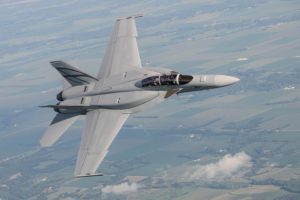
On Oct. 1, L3Harris [LHX] touted its experience building avionics systems for the U.S. Navy F/A-18 Hornets and Super Hornets a day after the company secured avionics supplier contracts for the aircraft.
On Sept. 30, the Pentagon said the company’s facilities in Palm Bay, Fla., had won $20 million including a more than $10 million contract to build 112 Fibre Channel Network Switches for Kuwaiti E/A-18G, F/A-18 E/F and E-2D aircraft and two switches for the Naval Air Warfare Center Aircraft Center’s Manned Flight Simulator Laboratory. Another nearly $10 million contract was awarded for 51 digital map computers (DMC) and 96 digital video map computers (DVMC) for U.S. F/A-18 E/Fs and AH-1Z and H-1 helicopters by Bell [TXT], as well as 13 DMCs for the government of Bahrain.
Hornets and Super Hornets have used Tactical Airborne Moving Map Capability (TAMMAC) DMCs to provide cockpit display graphics on the position of the aircraft and their position relative to targets, threats, and terrain. The DVMCs provide a high-resolution digital moving map image channel.
“L3Harris smart carriage and release technology ensures the F/A-18 can safely carry and deliver mission payloads while electronic warfare technology, including the [L3Harris] ALQ-214 Integrated Defensive Electronic Countermeasures (IDECM) system – one of the most sophisticated self-protection systems ever built – defends Hornets and Super Hornets from persistent and evolving electronic threats. Flying onboard the EA-18G Growler, the [L3Harris] ALQ-99, the Navy’s principal standoff jammer, provides powerful electronic attack capabilities and complete spectrum dominance to support joint operations in every domain,” L3Harris said.
In addition to the fibre channel network switches, DMCs, DVMCs, IDECM, and ALQ-99, L3Harris supplies other avionics systems for the Super Hornet, including distributed targeting processors, mass storage units, BRU-55 smart bomb rack units, active electronically scanned array radars, Q-134 conformal broadband antennas, digital memory devices, and Multi-function Information Distribution Systems (MIDS).